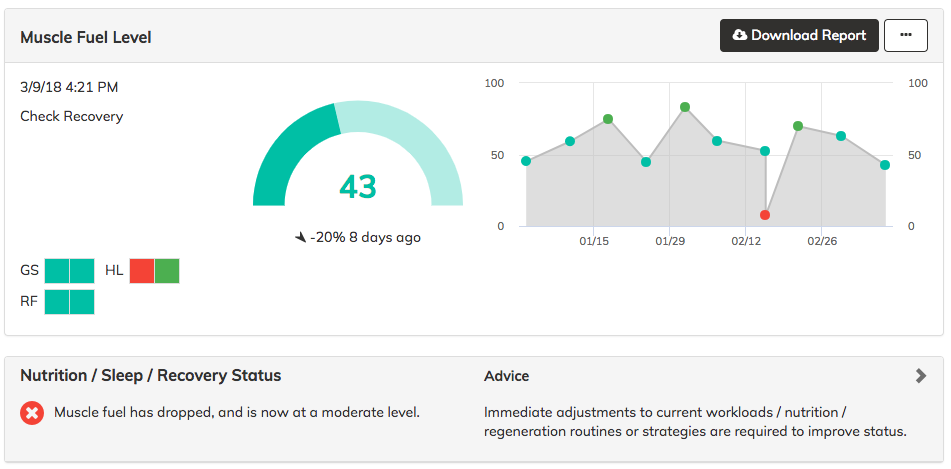MuscleHealth is defined as “The capacity of a muscle to store, generate and replenish energy” and is made up of several key factors: Muscle Size, Muscle Quality, Muscle Fuel and Body Composition.
The current NBA schedule is one of the most demanding in all of professional athletics. With an average of only approximately 1.5 days between games, and 41 games played on the road, MuscleHealth recovery from the previous game’s load combined with the stresses of frequent travel presents a considerable challenge. In fact, it is likely that NBA players never fully reach their optimum MuscleHealth during the season without the more extended rest available only at the All Star break, or the occasions when they are able to take consecutive nights off. In light of this, it is essential for NBA teams to consider the complex processes of rest and refueling as they relate to such short time constraints. With MuscleSound, optimizing MuscleHealth in elite athletes across the grind of the NBA season is now possible thanks to our patented ultrasound technology and system of assessments.

‘Monitor Recovery’ Assessment:
The existence of glycogen as the primary muscle energy source has been widely accepted. Multiple studies also show that low carbohydrate diets are linked to low levels of muscle glycogen (glycogen ‘depletion’), and this in turn is linked to fatigue and decreases in performance (Costill DL, et al 1992). Low carbohydrate intake and replenishment can be a serious issue for many high performance athletes who may find it difficult to even keep up with carbohydrate requirements. This situation is made even worse if their knowledge of the importance of carbohydrates is lacking. Time constraints and frequent travel can also disrupt refueling protocols, as nutritional options can be scarce under such circumstances without careful planning.
Due to this contracted nature of recovery periods between NBA games, it is likely essential to take in fluids and carbohydrates both during and immediately after a workout. Factors such as fluid and electrolyte status, muscle glycogen, reducing muscle stress and rebuilding muscle protein are all likely vital to a quick recovery. A team nutritionist should be consulted on this and individual fueling programs developed accordingly.
Furthermore, we know inconsistent sleep schedules due to factors such as compressed game schedules and travel can inhibit glycogen clearance (uptake) and efficiency (use) significantly, and those effects can linger until a proper schedule is re-established (Spiegel, et al., 1999). It is important that implementing an adequate sleep/rest routine is a priority along with nutritional and other muscle rebuilding and refueling protocols.
MuscleSound recommends using our Check Recovery assessment 24 hours (or a minimum of the following day) after a game or intense training session to provide accurate information on Muscle Fuel levels, which in turn can be used to design optimal game-to-game fuel level recovery protocols.
MuscleSound Summary
The continued use and development of MuscleSound enables the appreciation and attainment of optimal game readiness for every athlete. This readiness is a continuous balancing act between the physical and psychological responses to workload (games/training), individualized nutrition, and regeneration/recovery from those efforts. MuscleSound, along with the compilation and analysis of objective data from both individual and team, enables informed assessments to be made of the game readiness and health status of each athlete. To achieve these goals, we recommend the following actions:
- Ensure consistent nutritional monitoring
- Monitor each athlete’s unique readiness & recovery capacities for game and/or training
- Assess muscle fuel levels to help adjust with physical workloads.
- Increase each athlete’s individual muscle database with more frequent scans for optimization of readiness and recovery
- Find muscles that may be more vulnerable to strains, and assess for muscle symmetry across limbs to help prevent biomechanical variability
References:
Costill DL, Hargreaves M. Carbohydrate nutrition and fatigue. Sports Medicine 1992 Feb;13(2):86-92.
Spiegel K, Leproult R, Van Cauter E. Impact of sleep debt on metabolic and endocrine function. Lancet. 1999;354(9188): 1435–9.
